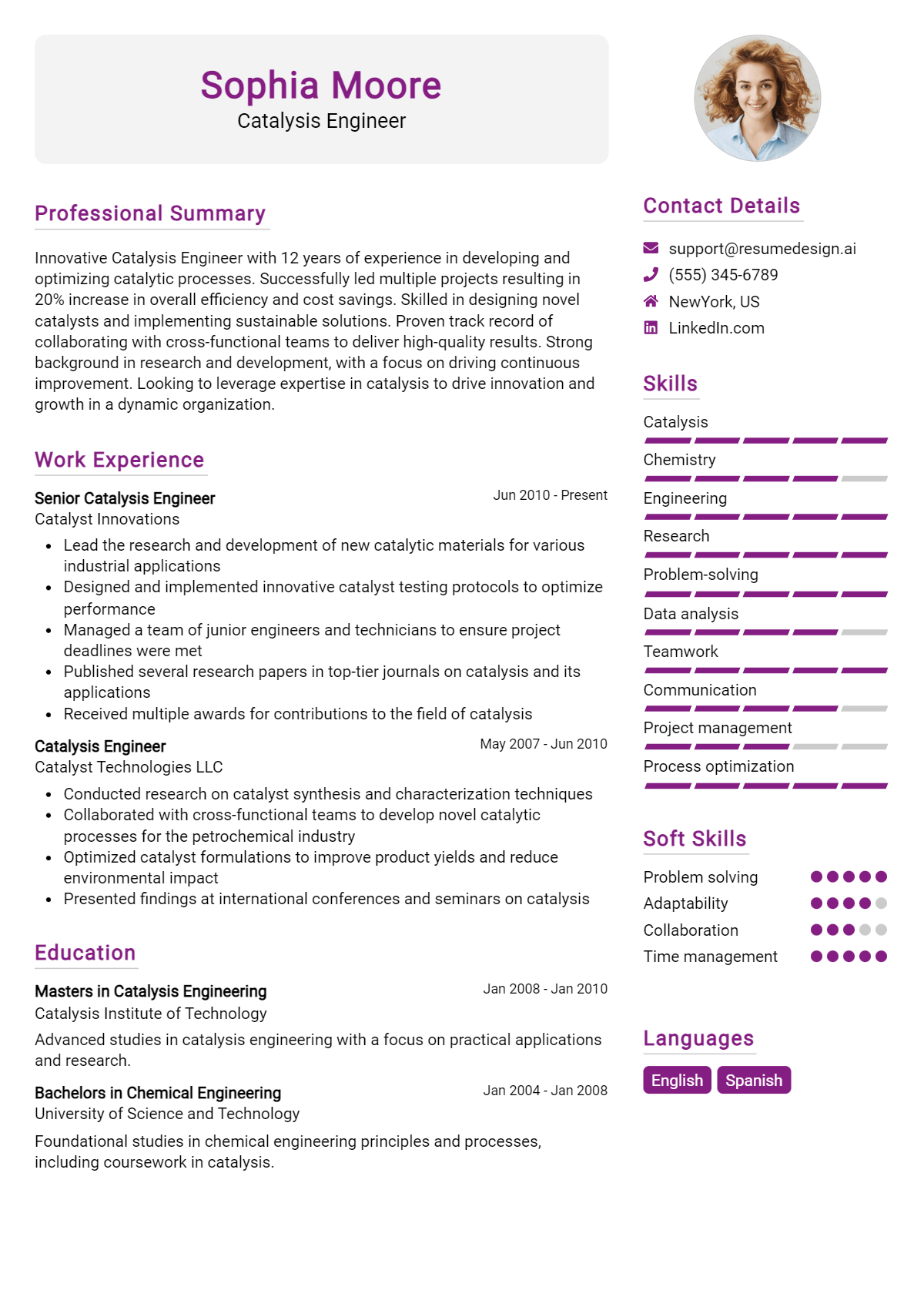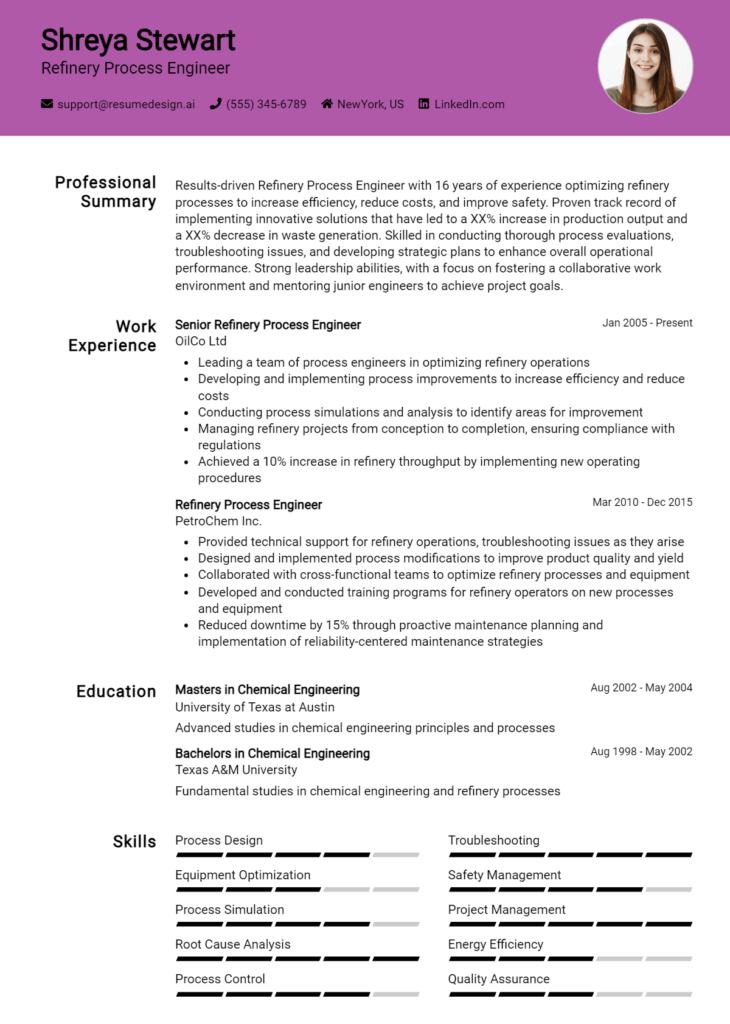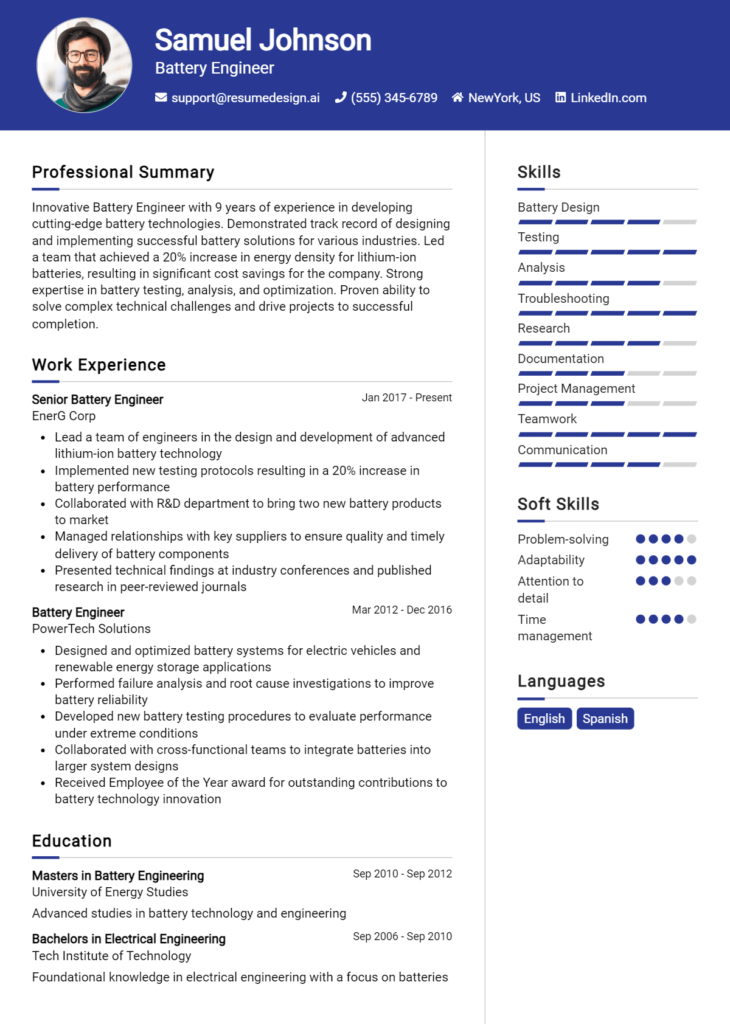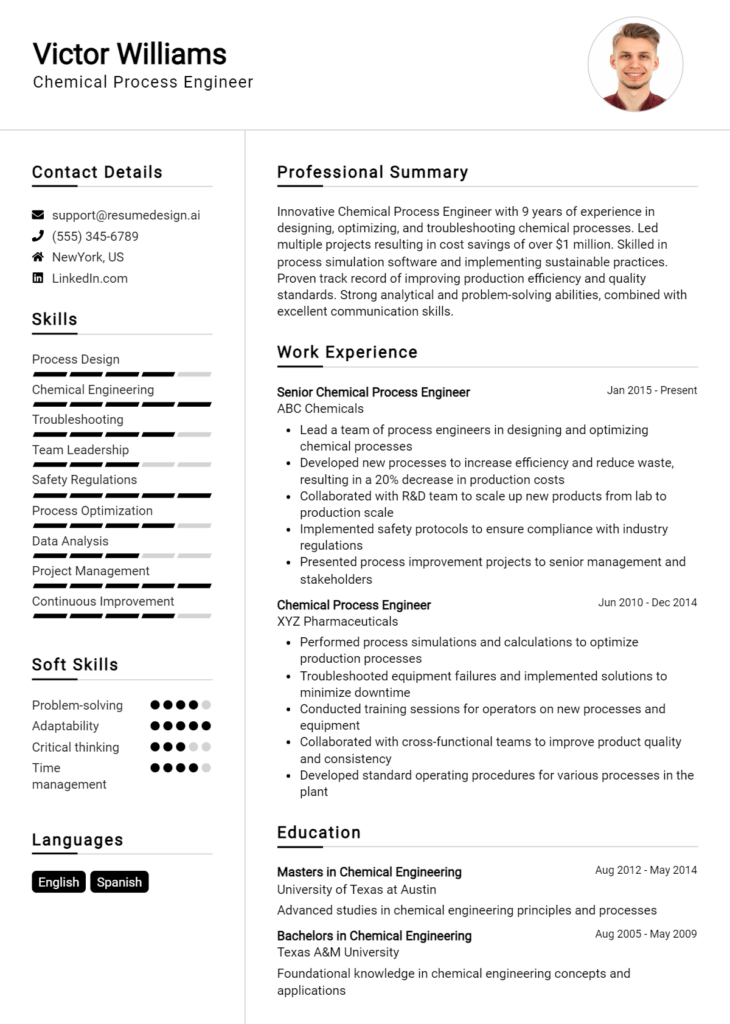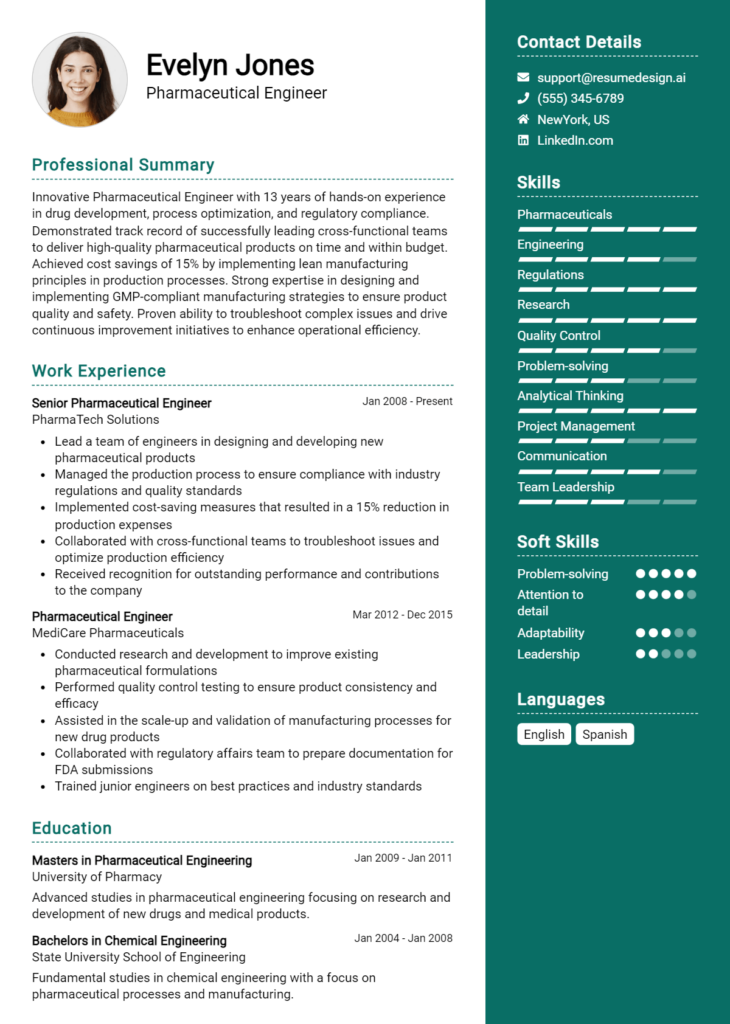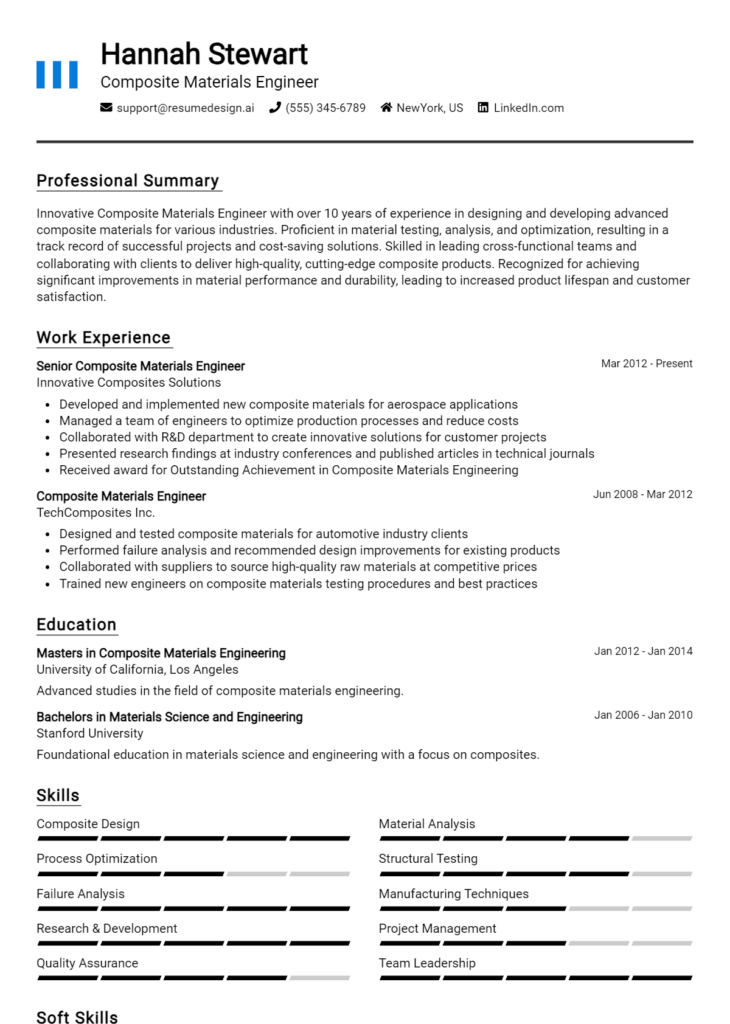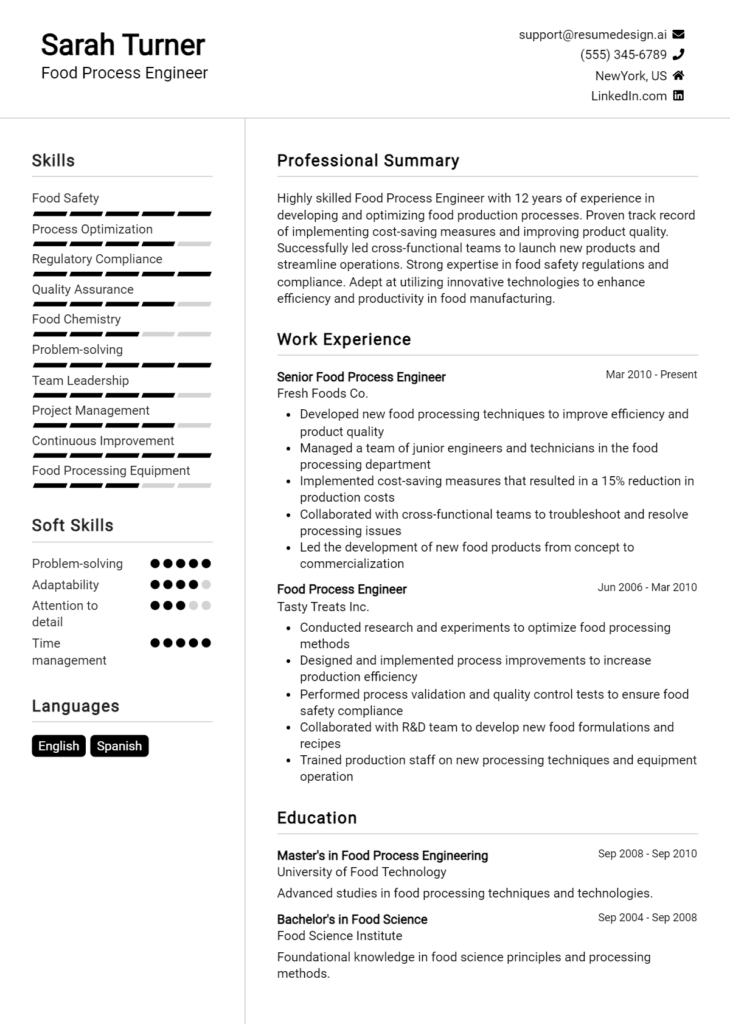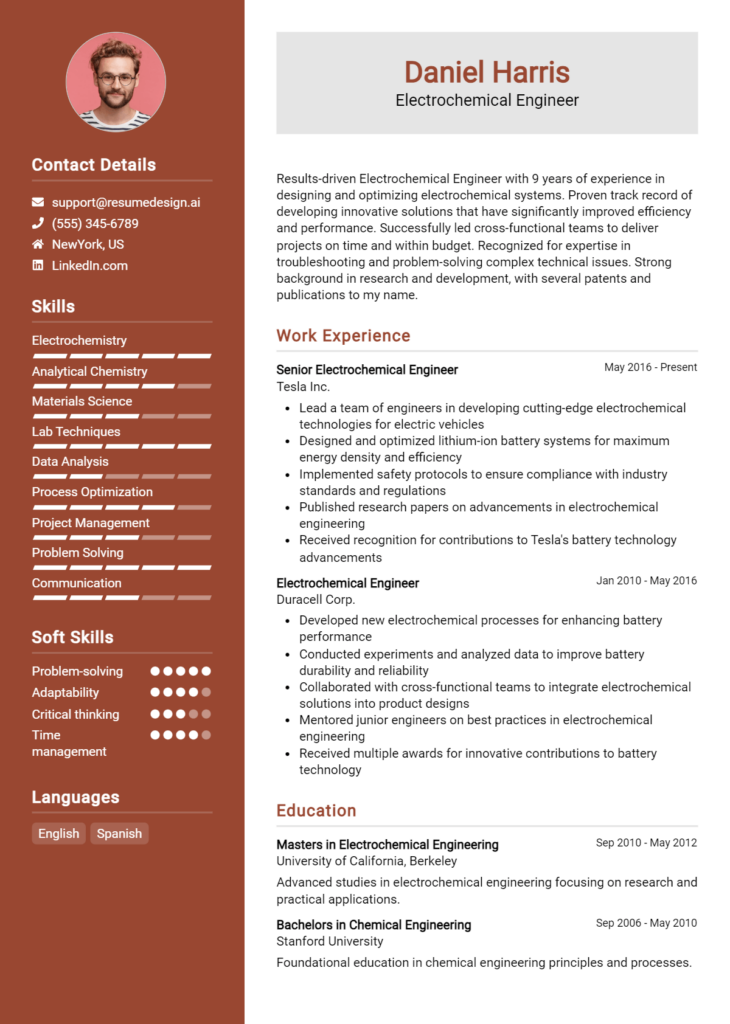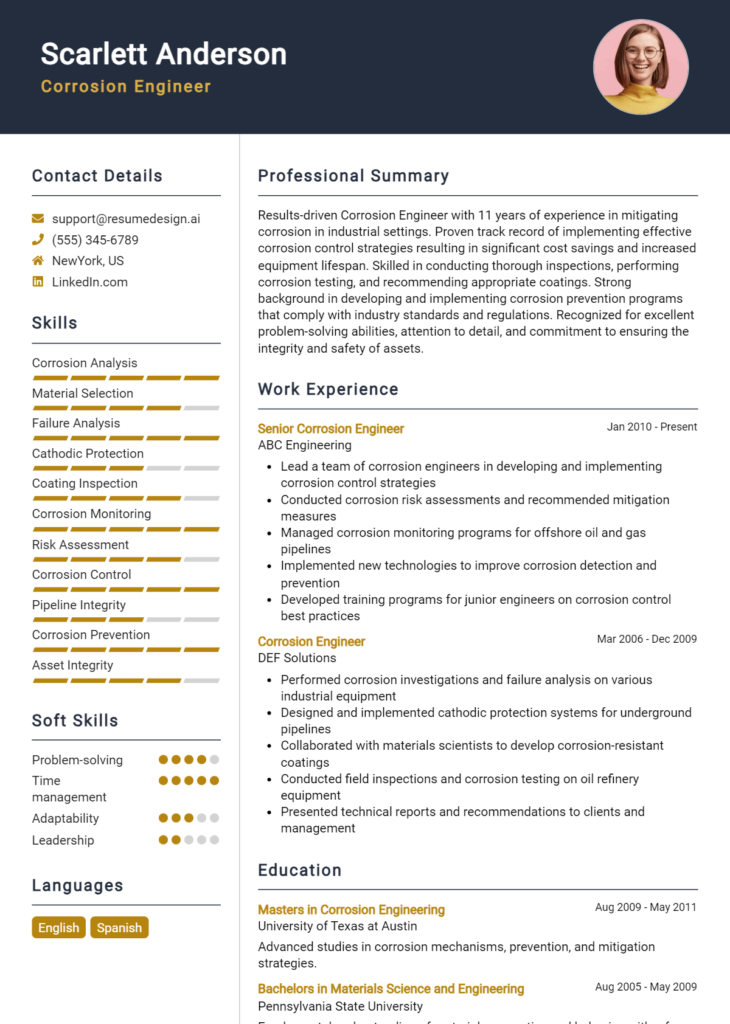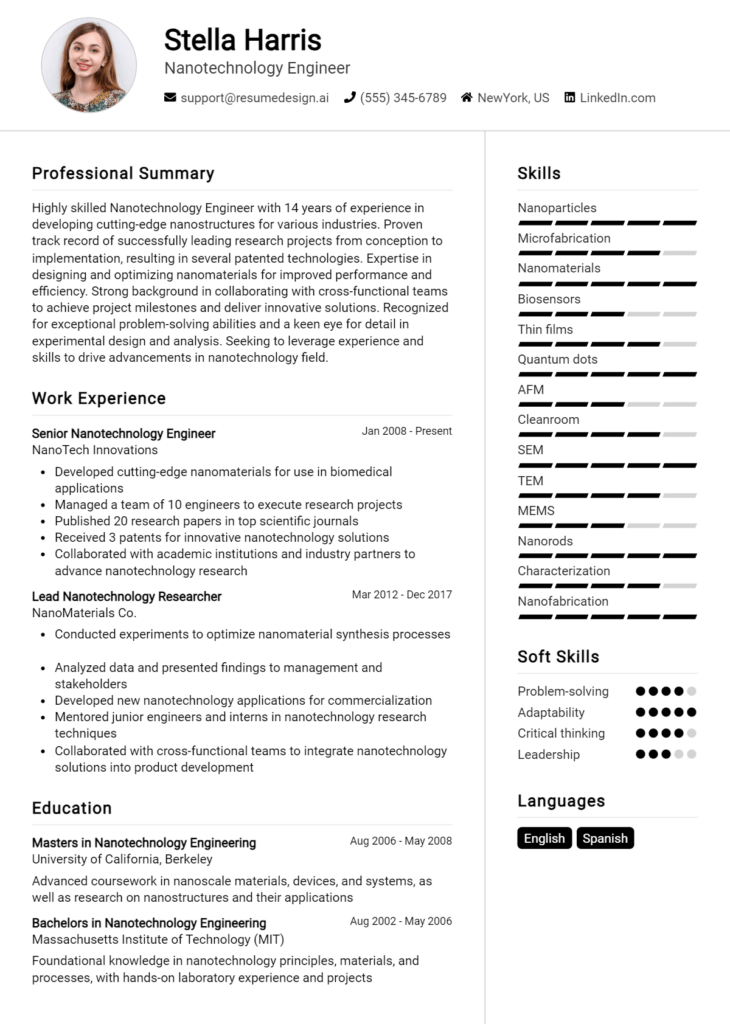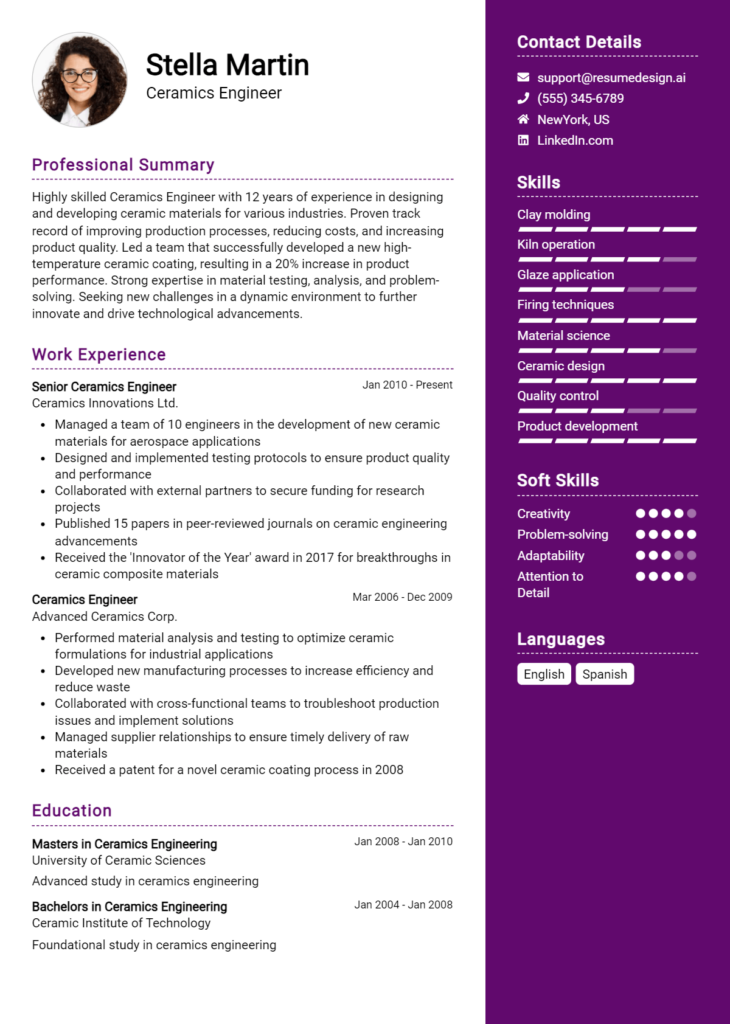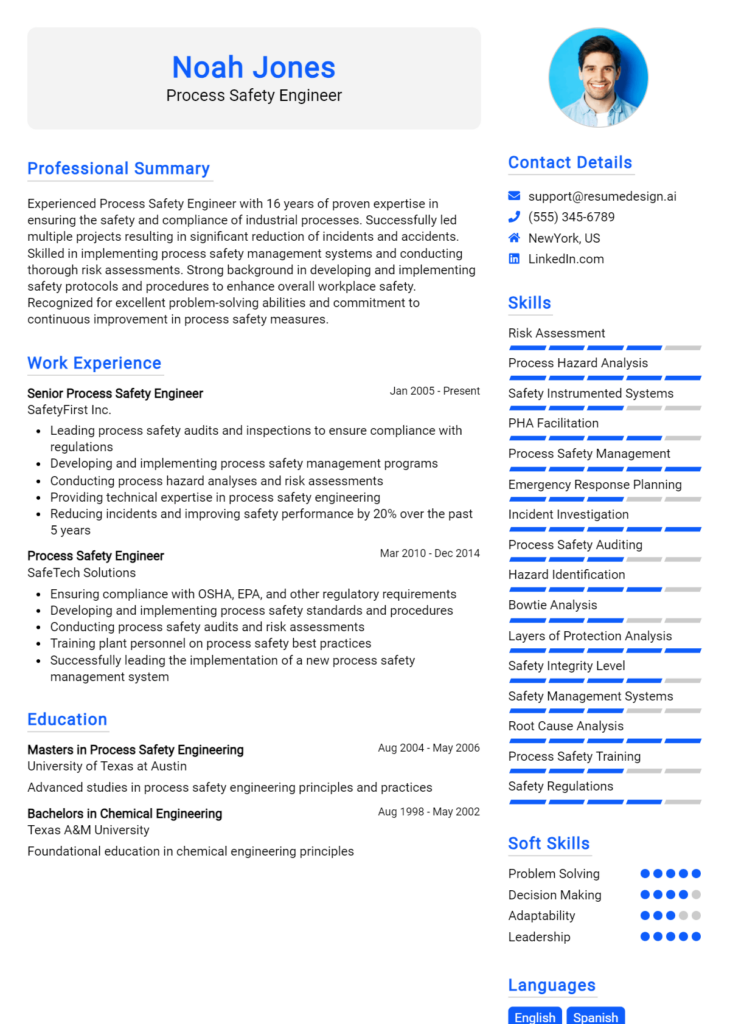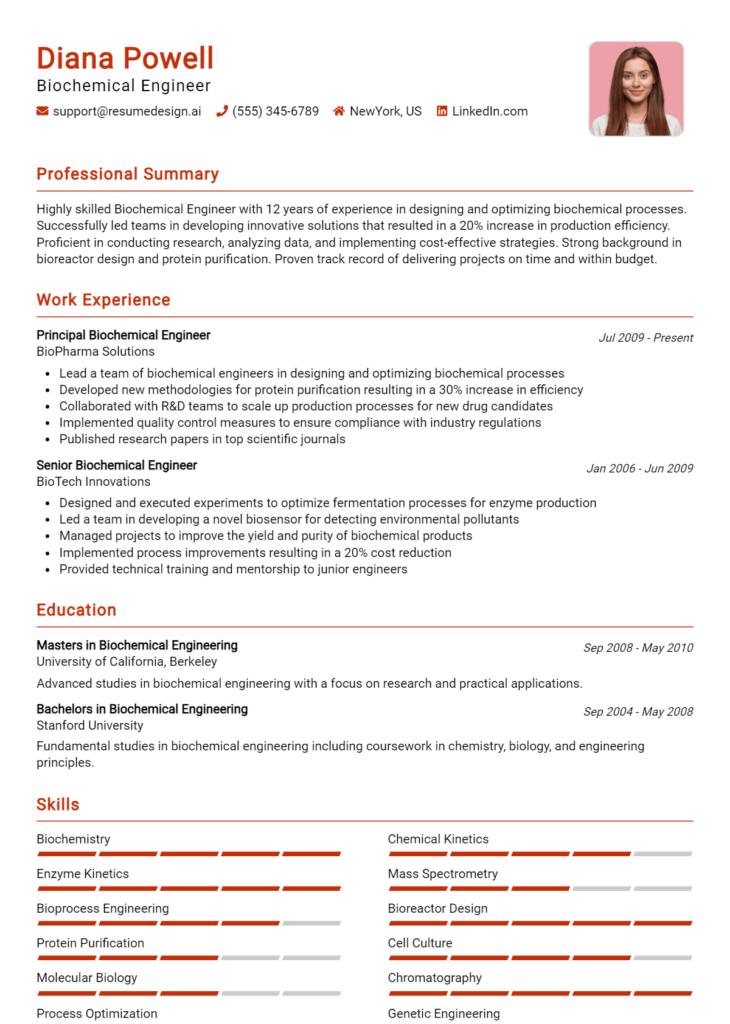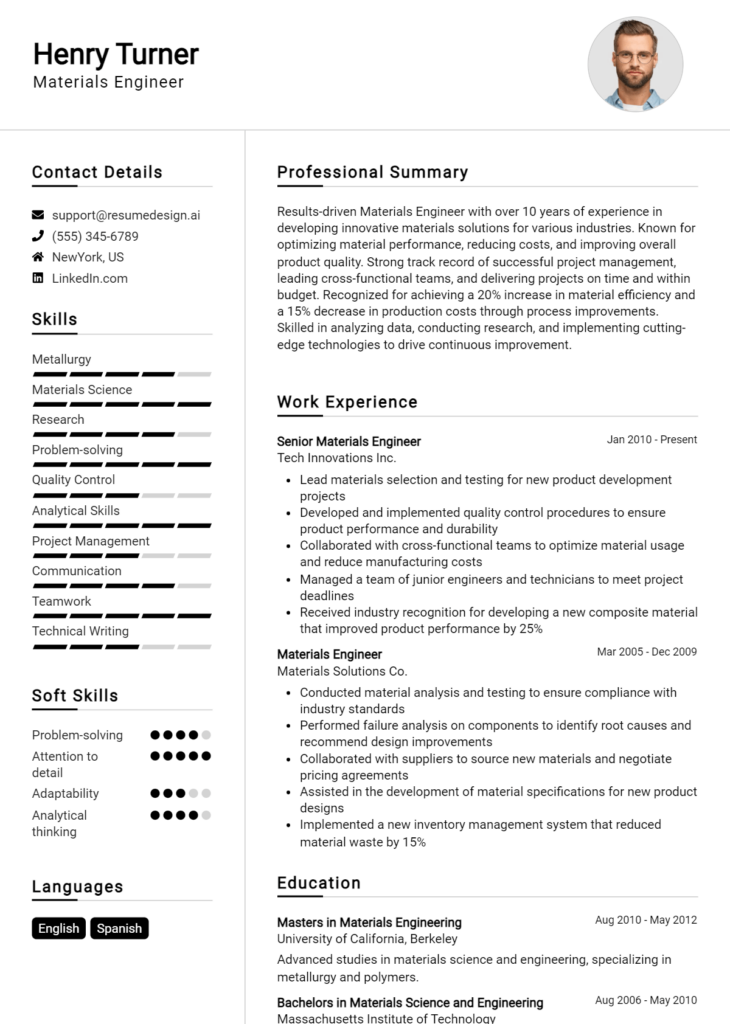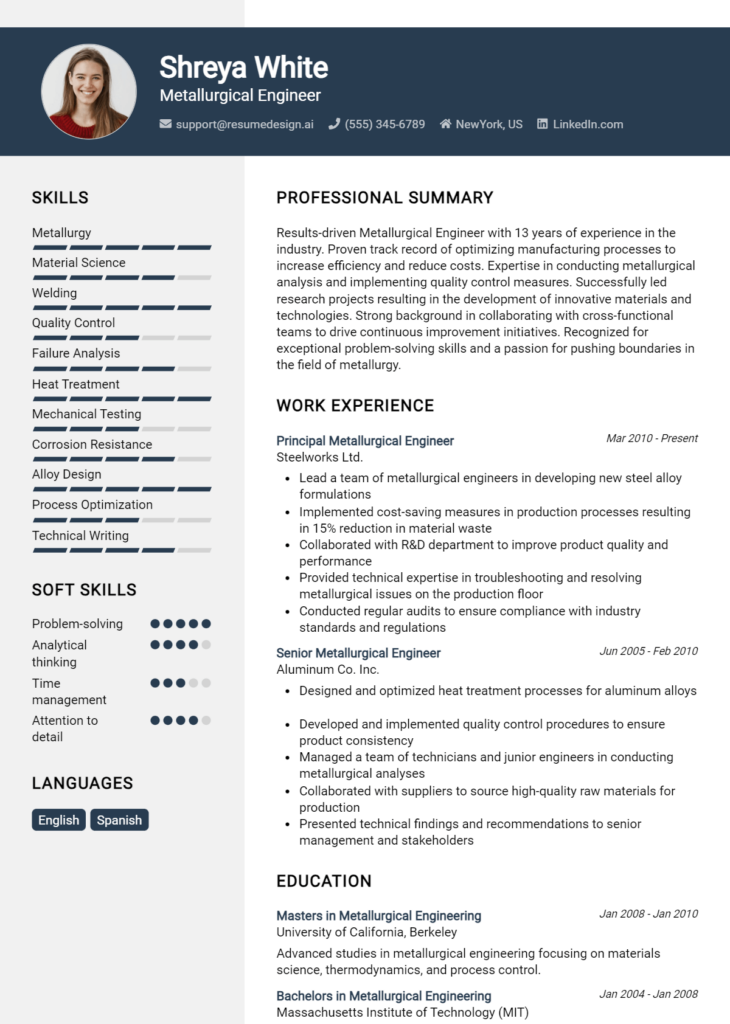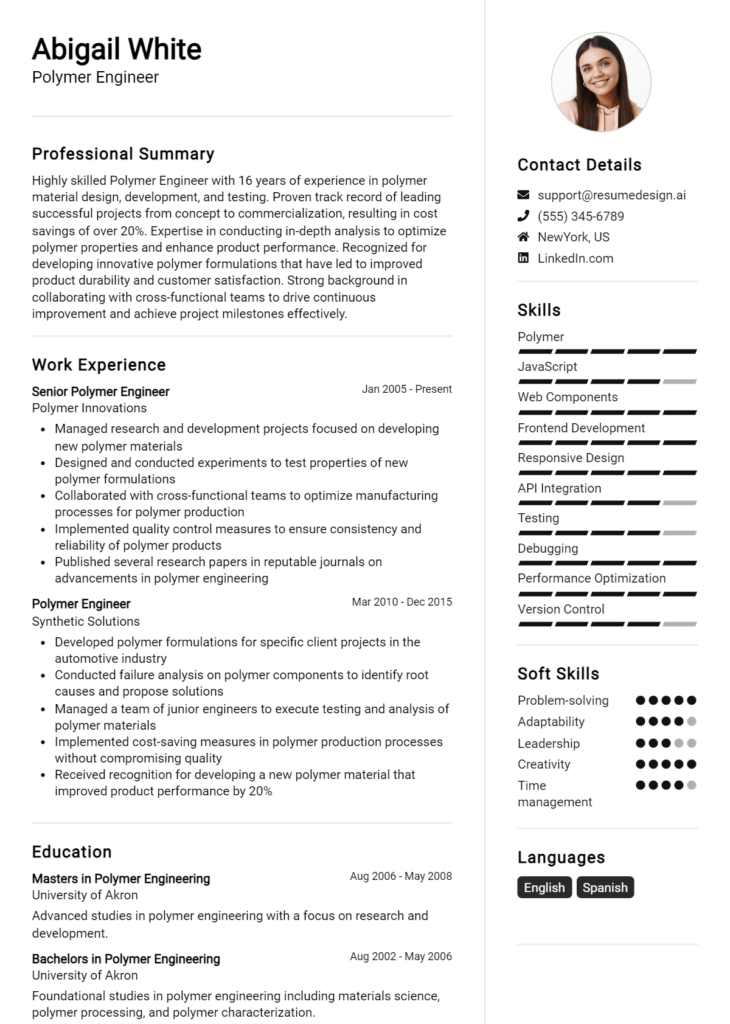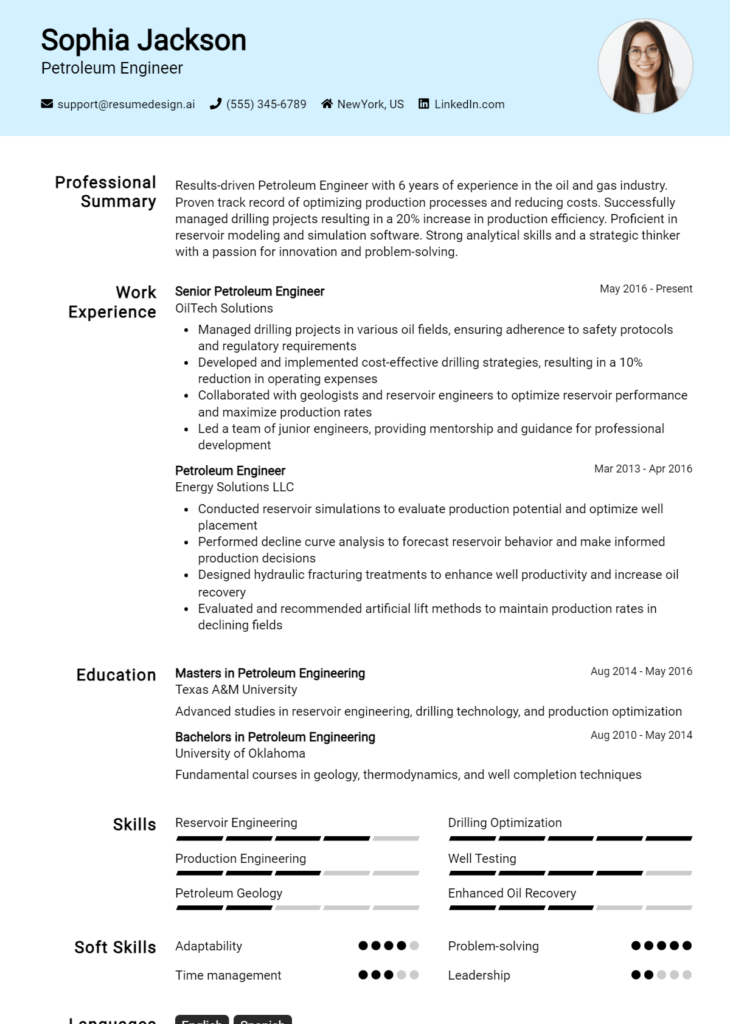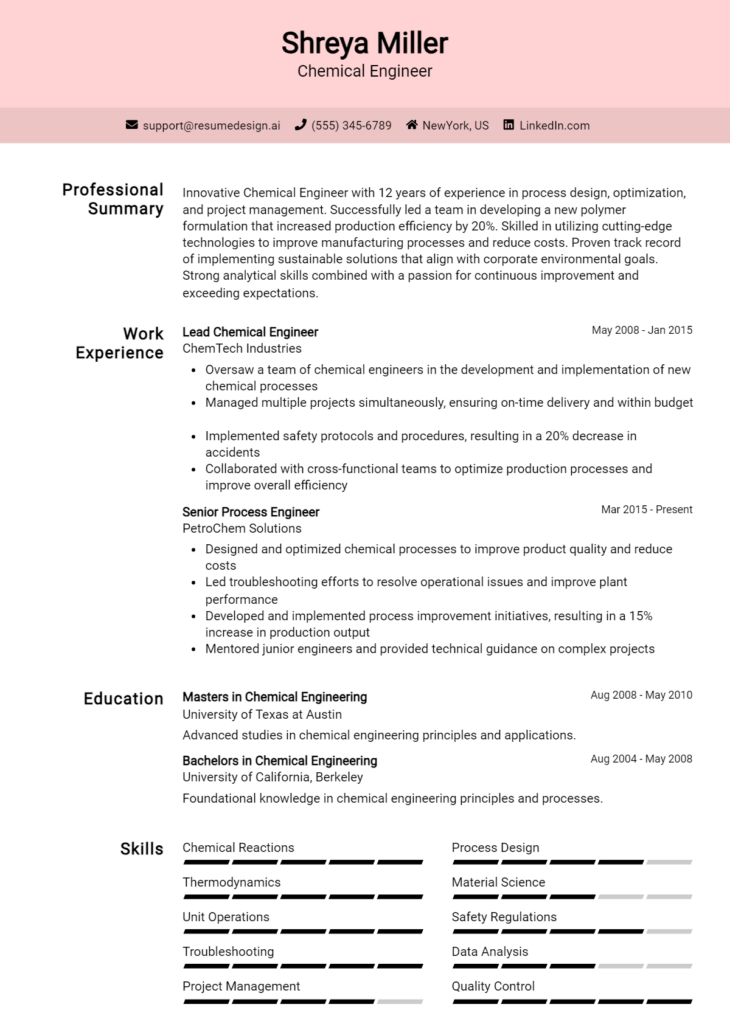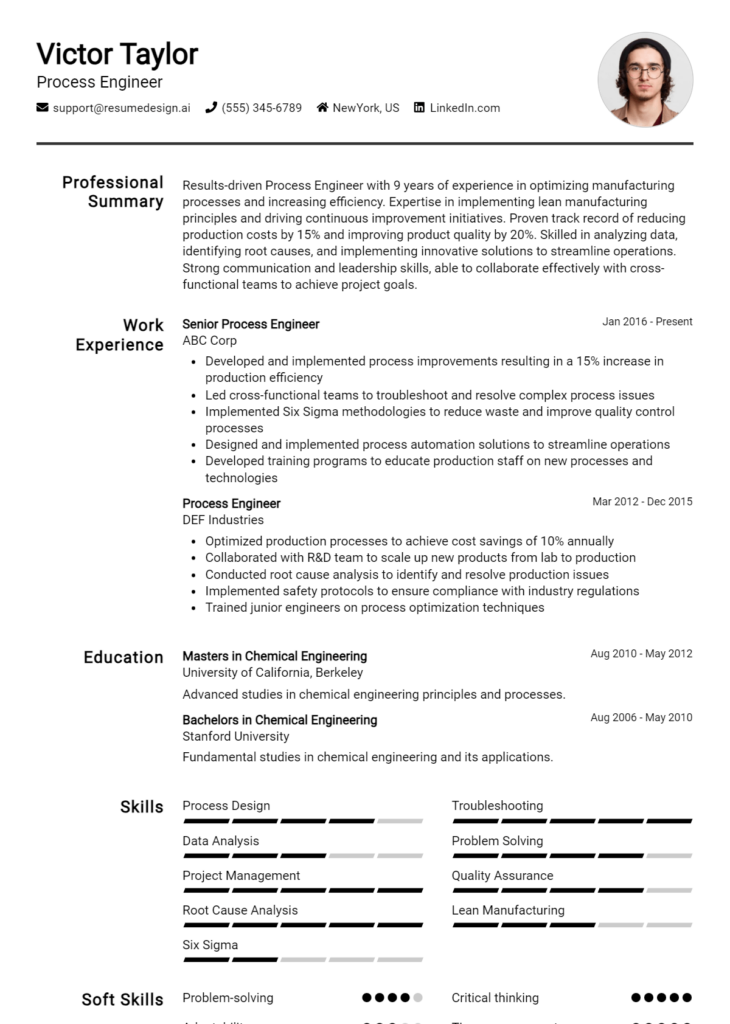Catalysis Engineer Core Responsibilities
A Catalysis Engineer plays a vital role in enhancing chemical processes, requiring a blend of technical expertise, operational insight, and strong problem-solving abilities. Key responsibilities include designing catalysts, optimizing reaction conditions, and conducting experiments to improve efficiency and sustainability. This role often bridges research and development, production, and quality assurance, ensuring that innovations align with organizational goals. A well-structured resume highlighting these skills can effectively demonstrate a candidate's qualifications and potential impact on the company's success.
Common Responsibilities Listed on Catalysis Engineer Resume
- Design and develop catalytic processes to enhance chemical reactions.
- Conduct laboratory experiments to test and evaluate catalysts.
- Analyze data to optimize reaction conditions and improve yields.
- Collaborate with cross-functional teams, including R&D, production, and quality assurance.
- Implement safety and environmental regulations in catalyst development.
- Perform troubleshooting and problem-solving for catalytic systems.
- Document experimental procedures and results for regulatory compliance.
- Stay updated on industry trends and emerging technologies in catalysis.
- Provide technical support and training to operational teams.
- Evaluate and select suitable catalysts for specific applications.
- Prepare reports and presentations for stakeholders on research findings.
- Participate in project management and lead development initiatives.
High-Level Resume Tips for Catalysis Engineer Professionals
In the competitive field of catalysis engineering, a well-crafted resume is essential for making a strong first impression on potential employers. Your resume serves as a snapshot of your professional journey, showcasing not just your technical skills, but also your accomplishments and the unique contributions you can bring to an organization. It is the first opportunity to demonstrate your expertise and passion for catalysis, making it crucial to create a document that reflects both your skills and achievements effectively. This guide will provide practical and actionable resume tips specifically tailored for Catalysis Engineer professionals, helping you stand out in a crowded job market.
Top Resume Tips for Catalysis Engineer Professionals
- Tailor your resume to each job description by incorporating relevant keywords and phrases that match the requirements of the position.
- Highlight your technical skills, such as experience with catalytic processes, reaction engineering, and material characterization techniques.
- Quantify your achievements by including specific metrics, such as percentage improvements in yield or reductions in reaction time.
- Showcase relevant experience, including internships, research projects, or professional roles that directly relate to catalysis.
- Include certifications or specialized training that enhance your qualifications, such as Lean Six Sigma or specific software tools used in catalysis.
- Demonstrate your problem-solving abilities by describing challenges you have faced and the innovative solutions you implemented.
- List publications or presentations at conferences to showcase your contributions to the field and commitment to ongoing learning.
- Incorporate soft skills that are valuable in team settings, such as communication, collaboration, and project management.
- Utilize a clean and professional format that enhances readability and ensures key information is easy to locate.
- Proofread your resume carefully to eliminate any grammatical errors or typos that could detract from your professionalism.
By implementing these targeted tips, you can significantly enhance your chances of securing a position in the catalysis engineering field. A polished and well-structured resume not only highlights your qualifications but also communicates your enthusiasm and dedication to potential employers, setting the stage for a successful job search.
Why Resume Headlines & Titles are Important for Catalysis Engineer
In the competitive field of catalysis engineering, a well-crafted resume headline or title holds significant importance. It serves as a first impression, allowing candidates to succinctly communicate their unique qualifications and expertise to hiring managers. A strong headline can captivate attention instantly, summarizing a candidate's key strengths in a single impactful phrase. It should be concise, relevant, and tailored specifically to the job being applied for, ensuring that it not only highlights the candidate's skills but also aligns with the employer's needs.
Best Practices for Crafting Resume Headlines for Catalysis Engineer
- Keep it concise: Aim for one strong sentence or phrase.
- Be role-specific: Use terminology and keywords relevant to catalysis engineering.
- Highlight key qualifications: Focus on your most impressive skills or accomplishments.
- Use action-oriented language: Start with strong verbs to convey proactivity.
- Tailor for each application: Customize your headline for the specific job description.
- Incorporate metrics: If possible, include quantifiable achievements to boost credibility.
- Avoid jargon: Use clear language that can be understood by a broader audience.
- Ensure clarity: Make sure the headline reflects your primary competencies effectively.
Example Resume Headlines for Catalysis Engineer
Strong Resume Headlines
"Innovative Catalysis Engineer with 7+ Years in Sustainable Chemical Processes"
“Expert in Catalytic Reaction Design and Optimization for Industrial Applications”
“Results-Driven Catalysis Specialist with Proven Track Record in R&D Projects”
“Dynamic Chemical Engineer Focused on Advancing Green Catalysis Technologies”
Weak Resume Headlines
“Engineer Looking for Opportunities”
“Catalysis Engineer with Experience”
The strong headlines are effective because they clearly communicate the candidate’s expertise, focus on relevant skills, and highlight their unique contributions to the field of catalysis engineering. They capture attention with specific details and actionable language. In contrast, the weak headlines fail to impress due to their vagueness and lack of specificity; they do not convey any real strengths or qualifications, making it difficult for hiring managers to see the value of the candidate at a glance.
Writing an Exceptional Catalysis Engineer Resume Summary
A well-crafted resume summary is a crucial element for a Catalysis Engineer, as it serves as the first impression to hiring managers. This brief yet powerful section quickly captures attention by showcasing key skills, relevant experience, and notable accomplishments directly related to the desired job role. A strong summary is concise, impactful, and meticulously tailored to align with the specific job description, ensuring that the candidate stands out in a competitive job market.
Best Practices for Writing a Catalysis Engineer Resume Summary
- Quantify Achievements: Include specific metrics or outcomes to demonstrate the impact of your work.
- Focus on Relevant Skills: Highlight key technical skills and methodologies pertinent to catalysis engineering.
- Tailor to Job Description: Customize your summary to reflect the specific requirements and language used in the job posting.
- Use Action-Oriented Language: Start sentences with strong action verbs to convey proactivity and results.
- Keep it Concise: Aim for 3-5 sentences that encapsulate your qualifications without overwhelming the reader.
- Showcase Industry Knowledge: Mention familiarity with relevant technologies, processes, or regulatory standards.
- Highlight Problem-Solving Abilities: Emphasize your capability to address challenges within the field of catalysis.
- Include Professional Recognition: If applicable, mention any awards or recognition that showcase your expertise.
Example Catalysis Engineer Resume Summaries
Strong Resume Summaries
Results-driven Catalysis Engineer with over 7 years of experience in developing innovative catalysts that improved reaction efficiency by 30%. Proven expertise in heterogeneous catalysis and advanced characterization techniques. Successfully led a team project that resulted in a patented catalyst technology, enhancing production yield by 25%.
Dynamic Catalysis Engineer skilled in optimizing catalytic processes, having reduced operational costs by 15% through methodical analysis and redesign. Extensive experience with process scale-up and regulatory compliance, coupled with a strong background in academic research that led to 5 publications in peer-reviewed journals.
Dedicated Catalysis Engineer with a solid track record of designing and implementing novel catalytic systems. Achieved a 40% reduction in catalyst deactivation rates through innovative formulation strategies. Expertise in both R&D and pilot plant operations, contributing to multiple successful commercial product launches.
Weak Resume Summaries
Experienced engineer looking for a job in catalysis with various skills in the field.
Catalysis Engineer with a background in engineering and some experience working with catalysts. Eager to apply knowledge in a professional setting.
The strong resume summaries are effective because they provide specific details about achievements and skills, showcasing quantifiable results and direct relevance to the role. In contrast, the weak summaries lack specificity, failing to convey the candidate's impact or unique qualifications, thus making them less compelling to hiring managers.
Work Experience Section for Catalysis Engineer Resume
The work experience section is a critical component of a Catalysis Engineer resume, as it serves as a window into the candidate's professional journey and technical expertise. This section not only highlights the candidate's ability to manage teams and projects but also emphasizes their commitment to delivering high-quality products in the field of catalysis. By quantifying achievements and aligning experiences with industry standards, candidates can effectively demonstrate their value to potential employers and their capability to drive innovation in catalysis engineering.
Best Practices for Catalysis Engineer Work Experience
- Highlight specific technical skills relevant to catalysis, such as reaction kinetics, catalyst design, and characterization techniques.
- Quantify achievements with metrics, such as improved yield percentages or cost savings generated through process optimization.
- Showcase collaboration by detailing successful teamwork in multidisciplinary projects or cross-functional teams.
- Use action verbs to convey a sense of initiative and responsibility in past roles.
- Align experience descriptions with industry standards and terminology to resonate with hiring managers.
- Include relevant certifications or training that support your expertise in catalysis.
- Keep descriptions concise but detailed enough to convey complexity and impact.
- Tailor the work experience section for each application to highlight the most relevant experiences.
Example Work Experiences for Catalysis Engineer
Strong Experiences
- Led a team of 5 engineers in the development of a novel catalyst that increased reaction efficiency by 30%, resulting in a $500,000 annual cost reduction.
- Designed and implemented a new catalyst characterization protocol that improved data accuracy by 25%, facilitating better decision-making in R&D.
- Collaborated with cross-functional teams to scale up catalyst production, achieving a 20% increase in output without compromising quality.
- Managed a project that successfully reduced catalyst deactivation rates by 40%, extending the operational lifespan of the catalyst in industrial applications.
Weak Experiences
- Worked on various catalyst projects without specifying outcomes or contributions.
- Assisted in experiments and lab work that were not detailed or quantified.
- Participated in team meetings related to catalysis, with no mention of the impact of those meetings.
- Engaged in troubleshooting issues without outlining specific problems addressed or solutions implemented.
The examples listed highlight the stark contrast between strong and weak experiences. Strong experiences are characterized by specific, quantifiable achievements that illustrate the candidate's technical leadership and collaborative efforts. In contrast, weak experiences lack detail and measurable outcomes, making it difficult for employers to gauge the candidate's actual contributions and skills in the field of catalysis engineering.
Education and Certifications Section for Catalysis Engineer Resume
The education and certifications section of a Catalysis Engineer resume is crucial for demonstrating the candidate's academic background, industry-relevant certifications, and commitment to continuous learning. This section allows candidates to showcase their qualifications and specific knowledge that directly relates to catalysis and chemical engineering. By including relevant coursework, specialized training, and recognized certifications, candidates can significantly enhance their credibility and better align themselves with the requirements of the job role, making a compelling case to potential employers.
Best Practices for Catalysis Engineer Education and Certifications
- Include degrees from accredited institutions, emphasizing those in Chemical Engineering, Chemistry, or related fields.
- Highlight industry-recognized certifications, such as those from the American Institute of Chemical Engineers (AIChE) or similar organizations.
- List relevant coursework that demonstrates expertise in catalysis, reaction engineering, or materials science.
- Include ongoing professional development training and workshops to showcase commitment to staying current in the field.
- Be specific about the level of education (e.g., Bachelor's, Master's, PhD) and the date of completion.
- Order the education and certifications section chronologically, starting with the most recent qualifications.
- Use clear formatting to separate different degrees and certifications for easy readability.
- Tailor the section to emphasize qualifications that align most closely with the desired job description.
Example Education and Certifications for Catalysis Engineer
Strong Examples
- Master of Science in Chemical Engineering, University of California, Berkeley, 2022
- Certified Chemical Engineer (CCE), American Institute of Chemical Engineers (AIChE), 2023
- Relevant Coursework: Advanced Catalysis, Reaction Engineering, and Process Optimization
- Completed a specialized training program in Heterogeneous Catalysis, 2021
Weak Examples
- Bachelor of Arts in History, University of XYZ, 2010
- Certification in Project Management, International Project Management Association, 2015
- Relevant Coursework: Introduction to Psychology
- Attended a workshop on Basic Computer Skills, 2019
The strong examples listed above are considered effective because they directly relate to the field of catalysis engineering, showcasing relevant degrees, certifications, and specialized training that enhance the candidate's qualifications. In contrast, the weak examples fail to demonstrate a connection to the role of a Catalysis Engineer, as they include degrees and certifications outside the relevant technical and scientific domains, thereby diminishing the candidate's credibility in the eyes of potential employers.
Top Skills & Keywords for Catalysis Engineer Resume
In the competitive field of catalysis engineering, showcasing the right skills on your resume is crucial for standing out to potential employers. As a Catalysis Engineer, your expertise not only lies in technical knowledge but also in a range of soft skills that facilitate effective collaboration and innovation. A well-crafted resume highlighting both hard and soft skills can significantly enhance your chances of landing a desirable position. By emphasizing these competencies, you demonstrate your ability to contribute to the development of efficient catalytic processes, which are vital in various industries such as pharmaceuticals, energy, and environmental science.
Top Hard & Soft Skills for Catalysis Engineer
Soft Skills
- Problem-solving aptitude
- Effective communication
- Team collaboration
- Critical thinking
- Adaptability
- Time management
- Attention to detail
- Creativity
- Leadership
- Interpersonal skills
- Analytical mindset
- Conflict resolution
- Decision-making
- Project management
- Conflict resolution
- Research-oriented mindset
- Initiative
Hard Skills
- Catalytic process design
- Reaction kinetics
- Thermodynamics
- Catalyst characterization techniques
- Data analysis and interpretation
- Chemical engineering principles
- Process optimization
- Laboratory techniques (e.g., chromatography, spectroscopy)
- Computational modeling and simulation
- Knowledge of chemical safety protocols
- Experience with industrial catalysis
- Statistical analysis
- Scale-up processes
- Material science
- Process control systems
- Quality assurance and regulatory compliance
- Technical report writing
To further enhance your resume, consider integrating relevant skills and detailing your work experience in the field of catalysis engineering. This approach will provide a comprehensive overview of your qualifications and professional journey, making you a strong candidate in the eyes of recruiters.
Stand Out with a Winning Catalysis Engineer Cover Letter
I am writing to express my interest in the Catalysis Engineer position at [Company Name], as advertised on [Job Board/Company Website]. With a strong background in chemical engineering and specialized expertise in catalysis research and development, I am excited about the opportunity to contribute to your team's innovative projects. My academic credentials, combined with hands-on experience in catalyst design and optimization, make me a suitable candidate for this role.
During my previous role at [Previous Company Name], I successfully led multiple projects focused on the synthesis and characterization of novel catalysts for various chemical reactions. My work involved utilizing advanced analytical techniques such as gas chromatography and spectroscopy to evaluate catalyst performance and stability. I also collaborated closely with cross-functional teams to troubleshoot and streamline processes, resulting in a 15% increase in overall efficiency. I am particularly proud of a project where I developed a new catalytic process that reduced reaction times by 30%, significantly enhancing production throughput.
In addition to my technical skills, I am a strong communicator and collaborator. I believe that effective teamwork is crucial in driving innovative solutions in the field of catalysis. I am adept at presenting complex data and findings to stakeholders, ensuring alignment on project goals and strategies. Furthermore, my passion for continuous learning drives me to stay updated on the latest advancements in catalysis technology and methodologies, allowing me to bring fresh ideas to the table.
I am excited about the possibility of joining [Company Name] and contributing to your commitment to excellence in catalysis engineering. Thank you for considering my application. I look forward to the opportunity to discuss how my skills and experiences align with the goals of your team.
Common Mistakes to Avoid in a Catalysis Engineer Resume
When crafting a resume as a Catalysis Engineer, it's crucial to present your qualifications and experiences effectively to stand out in a competitive job market. However, many candidates make common mistakes that can detract from their overall presentation and impact. By avoiding these pitfalls, you can enhance your resume and better showcase your expertise in catalysis and chemical engineering. Here are some frequent mistakes to watch out for:
Lack of Specificity: Failing to provide specific examples of your work can make your resume bland. Instead of saying "worked on catalyst development," detail what types of catalysts, processes, or technologies you were involved with.
Generic Objective Statement: Using a vague objective statement can make your resume blend in with others. Tailor your objective to reflect your goals and how they align with the company’s mission.
Ignoring Keywords: Many companies use Applicant Tracking Systems (ATS) to filter resumes. Not incorporating relevant industry keywords can lead to automatic disqualification. Review job descriptions and include pertinent terms related to catalysis and chemical engineering.
Inconsistent Formatting: Inconsistent font sizes, styles, or bullet points can make your resume look unprofessional. Maintain uniform formatting for a clean, polished appearance.
Overloading with Jargon: While technical terms are important, overloading your resume with jargon can make it difficult for non-specialists to understand your qualifications. Strive for a balance that showcases your expertise while remaining accessible.
Neglecting Achievements: Focusing solely on responsibilities rather than accomplishments can weaken your resume. Highlight specific achievements, such as successful projects, publications, or patents, to demonstrate your impact in previous roles.
Ignoring Soft Skills: While technical skills are vital, overlooking the importance of soft skills like teamwork, communication, and problem-solving can be a mistake. Employers value well-rounded candidates who can collaborate effectively.
Omitting Professional Development: Failing to mention ongoing education, certifications, or workshops related to catalysis can diminish your appeal. Highlighting your commitment to professional growth shows you are proactive in your field.
Conclusion
As a Catalysis Engineer, your expertise in chemical processes and reaction engineering plays a crucial role in the development and optimization of catalysts that drive various industrial applications. Throughout this article, we covered the essential skills and qualifications required for this role, including an in-depth understanding of thermodynamics, kinetics, and material science. We also discussed the importance of hands-on experience with catalyst characterization techniques and the ability to work collaboratively in multidisciplinary teams.
In today’s competitive job market, having a well-crafted resume is vital to showcase your qualifications effectively. Ensure that your resume highlights your technical skills, project experiences, and any relevant certifications that set you apart from other candidates.
Now is the perfect time to review and enhance your Catalysis Engineer resume. Take advantage of the available resources to create a standout application. Explore our resume templates for professional designs that suit your style. Use the resume builder to streamline the creation process and ensure your information is presented clearly and compellingly. Check out resume examples for inspiration on how to effectively structure your document. Lastly, don’t forget to craft a strong cover letter using our cover letter templates to complement your resume.
Take the next step in your career journey—revise your resume today and position yourself as the ideal candidate in the field of catalysis engineering!

